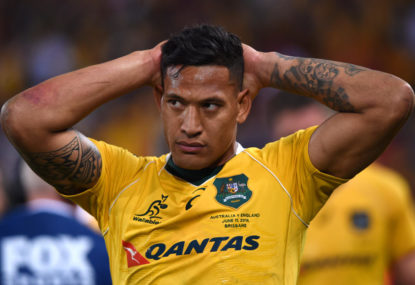In case you missed it, things are not going well for rugby in Australia right now. At the top level, the Wallabies and Super Rugby teams have found themselves left wanting game after game when it really matters.
The past few weeks of poor performances have seen the Wallabies get white washed at home by the English, in disappointment that quickly turned darker at how badly we were beaten.
Australia’s Super Rugby teams have managed to get the minimum mandatory lone team in the Finals in the Brumbies, despite a season of being shown up.
Most feel comfortable enough that the Canberra side don’t need to be looking at hotel accommodation for the Semi Finals after their match against the Highlanders.
The past two weekends in Super Rugby have been hard for the Aussie teams and the 2016 Super Rugby championship so far has highlighted some worrying gaps. But let’s be specific – what are these gaps and what are the reasons behind them that could guide the ARU to some effective fixes.
Strategy and Execution
Many Roarers, including myself, have written recently about the lack of street smarts within Australian rugby teams currently. Throughout the Test series against England we saw the Wallabies unable to switch from Plan A to Plan B. In fact Plan B looked a lot like it was “let’s do Plan A faster.”
At the Super Rugby level the Australian mentality seems to be – “you may well score four tries but we’re going to score five”.
This is worrying for two reasons:
1. It is an acceptance that your defence is going to crack time and time again;
2. It relies hugely on the ability to attack effectively, no matter what the circumstance
There are many wonderful cliches in sport but one that seems to hold true in rugby is that attack wins games, defence wins championships.
There have been times throughout this rugby season where Aussie teams have carved the opposition apart with some wonderful tries scored. But you don’t get extra points for the style in which you score.
Just looking at the penultimate round of the Super Rugby, the Aussie sides conceded over 220 points across one weekend and five games. That’s worrying. Of course, teams have off days, but for all of them to have off days on the same day is not bad luck. It’s bad defence.
The English showed in the second Test the power of solid, well organised and fast rushing defence. They created very little in the game but were able to win the match and the series by kicking their goals and holding wave after wave of Australian attacks out. To compound this, the Aussies had no variety to their attack; no ability to think strategically and break their opponents down over 80 minutes.
 (AAP Image/Dave Hunt)
(AAP Image/Dave Hunt)
There’s no real evolving strategy at play. Looking deeper, the ability to execute the strategy also seems to be missing in action which leads on to the next two points.
Focus on ball handling over kicking
Australian players seem unwilling or unable to kick well out of hand. I’m not sure if this is because they don’t have the skill set or whether it’s an agreed approach to not kick, but Aussie teams are making it hard for themselves by not having this weapon in their armoury.
Throughout the Test series we saw a number of poor kicks from the Wallabies and this past weekend we saw yet another example. With the Waratahs handed an opportunity to win the game by scoring a converted try in the last few minutes, a good kick off was needed by Foley.
It was expected to see a boot that put the ball high and hung in the air, giving his forwards time to get under it and compete for possession that would put them 40 metres out from the Blues try line.
What happened was kind of symptomatic of the Australian rugby season so far – poor execution at a time that mattered and any chance of a fight back fizzled out. Foley didn’t kick the 10 metres and the Blues got the scrum in the middle of the field.
Kicking in rugby is not boring. It is not the unskilled players’ way out of running and passing. It is a critical skill that can build pressure on your opponents and give you time and control in a game that is fast paced and chaotic.
What is then even more confusing is this – if the Aussie sides are going to heavily prefer keeping the ball in hand, then surely it would be fair to expect that they would be very, very good at it. Yet, we see dropped ball all too often.
Lack of ball handling skills
What is more concerning is that Australian teams not only seem to be focused on keeping the ball in hand and moving it around, but they aren’t actually very good at it.
If your number one game plan is going to be to run the ball and pass precisely, then you absolutely have to have the basic ball skills to do that.
Time and again, in both Super Rugby and the Test series we saw handling errors from backs and forwards alike. In stark contrast were teams like the Crusaders and Chiefs whose high quality ball handling allowed them to punish teams from almost anywhere on the pitch. These teams create space and then put men into that space with crisp passing, perfectly popped offloads, and good lines of running.
There is something quite unnerving about an Australian rugby side that can’t pass and catch perfectly. It’s just not right – like seeing your Prime Minister in a pair of budgie smugglers. You recognise all the elements that are in front of you, but their broader context just doesn’t make sense and makes you feel something is very wrong.
This might be making a few too many connections but for me this makes me think that the coaching at more junior levels is just not where it needs to be. It’s almost like the Under 20s in the Holden Cup in the NRL – they just don’t seem to learn the defensive skills that you’d assume they would.
In Australian rugby the basic core skills just aren’t good enough to compete with the top clubs and nations at the moment.
Defence
I’ve already touched on the importance of defence in rugby and championships, but it’s worth reiterating with one more frustrating point.
This past weekend, the Waratahs had a real chance to put themselves beyond reach of the Brumbies and secure Finals rugby. They had to play well, but they had shown during the season that on their day they can beat most if not any team.
Yet, when concentration, focus and good simple rugby was required the Tahs were found wanting. With almost every single ‘Tahs try against the Blues, they then allowed the Blues to score within three minutes.
This is something that is drilled into school boy teams – do not give away points just after you’ve scored.
Play simple rugby that secures possession, takes the sting out of any opposition revenge attack and control the ball and the game.
On the flip side, when the final whistle was ten minutes away and the game was still up for grabs, the Blues played cleverly with kicks in behind, forcing the Tahs to run from deep or take 22m drop outs that could then be contested.
Conclusion
It’s clear that these really aren’t individual points – they are all very closely connected and the better teams understand that a strong defence is part of a strong strategy, and that concentration is key to executing both game plans and ball skills alike.
But in a way that’s more worrying – it’s not just a case of getting the players tackling better or for the number 10s to practice their kicking from hand. There are fundamental, critical flaws with the way that Australian teams are playing at the moment both at club and country level.
Is it a life cycle thing? It could be. Sports absolutely go through peaks and troughs for individual clubs and nations alike.
In way we should probably hope that it is a life cycle situation because if its not then it could well point to other, harder to solve issues like under investment in junior rugby, weak development paths for coaches at all levels and a weakening player pool thanks to the attraction of overseas offers and the rise of other sports.
It hasn’t been all doom and gloom, to be fair. There have been some promising performances from a number of younger players such as Tom English at the Rebels. With so many top tier players heading overseas, the Aussie Super Rugby sides will need as many Tom Englishes as possible. And the Wallabies will want to see better coaching from the State coaches so that Cheika and his team have smarter, wiser players for the Rugby Championship.
The Rugby Championship and Bledisloe within is going to be so important for Australian rugby. The Super Rugby season and Test Series has thrown up a disappointing set of results. The coming Tests against the annual foes is an opportunity to show that those results were just an anomaly and that normal service is being resumed.
The very real alternative is that the Australians find themselves in a dog fight to avoid the wooden spoon against the South Africans and Argentinians.






























































































 (AAP Image/Dave Hunt)
(AAP Image/Dave Hunt)